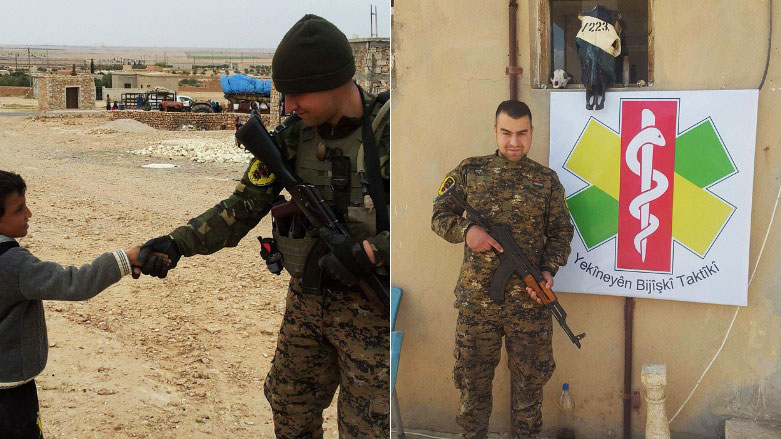Dutch Kurd sentenced to community service for fighting ISIS in Syria

ERBIL (Kurdistan 24) - A court in the Netherlands on Thursday sentenced a Dutch Kurd who in 2016 served as a volunteer for the People’s Protection Units’ (YPG) in Syria to 240 hours of community service and a six-month suspended sentence.
Although the former volunteer won't have to serve any time in jail, he said he is disappointed in the decision of the court, which chose to criminalize his actions.
The Dutch Public Prosecution Service had previously sought a sentence of three years in prison for the 30-year-old Dutch citizen known only as Devin, who in 2016 served as a volunteer for a medical unit of the People’s Protection Units (YPG) in Syria as part of operations against the Islamic State.
“I am shocked by this demand,” Devin earlier told Kurdistan 24 at the time. “The prosecution also doesn’t have concrete evidence and nothing is concrete. They only took a few pictures from my own Facebook [page] and a quote from John Hardin about the TMU in which he says it’s plausible that the medical unit participated in active combat.”
Devin was part of the YPG’s Tactical Medical Unit (TMU) during the battle for the control of Tabqa Dam. “I wanted to help people, fighters and civilians. I didn’t want to kill people, everybody can do that,” he said, according to a report of the Dutch newspaper AD.
“I carried a gun, you can see that on a lot of pictures. I also put those on Facebook. But that was for self-defense if IS (Islamic State) would attack the medical unit.”
Prosecutors charged him with “preparation for murder or manslaughter in Syria and/or Iraq,” but the court apparently did not find their arguments sufficiently compelling.
The Dutch newspaper AD reported that the court did consider it proven that the defendant was indeed engaged in “criminal preparations for manslaughter” because he carried an automatic firearm “with which he could kill if necessary.”
However, the judges gave a much lower sentence than the prosecution had demanded.
“The fact is that, by deliberately traveling to an area where violence is the order of the day, he has placed himself in the position that he might have to use violence,” the Dutch judges argued.
Lawyer Pepijn van der Vegt was quoted by the AD newspaper as saying that Devin was disappointed that the court ruled his actions as criminal. “There is no proof that the client himself used weapons against persons. It was never his intention to use violence.”
Macer Gifford, a British former YPG volunteer who also was a member of the same medical unit and has since written a book about his experiences in Syria earlier expressed solidarity with the Dutch fighter on Twitter.
“He went to Syria to help people, to resist ISIS and to show the world that internationalism is alive and well. It is absurd to harass and threaten him when thousands of ISIS fighters are waiting to come back to Europe.”
This is not the first time a Dutch citizen who has returned to the Netherlands after fighting against the Islamic State has been arrested or faced trial for doing so.
This is despite the fact that the YPG and its volunteers are supported by the US-led Coalition against the Islamic State, of which, since its founding, the Netherlands has been a member. Although Dutch ground forces have conducted no missions in Syria, the European nation’s military has provided air support there for other forces fighting the Islamic State.
In 2016, the Dutch Public Prosecution Service withdrew a case against the most well-known Dutch YPG volunteer, Jitse Akse, due to a lack of evidence.
Another Dutch volunteer known by the name Andok was arrested last year by Dutch police for being suspected of “participating in armed combat.”
Editing by John J. Catherine
